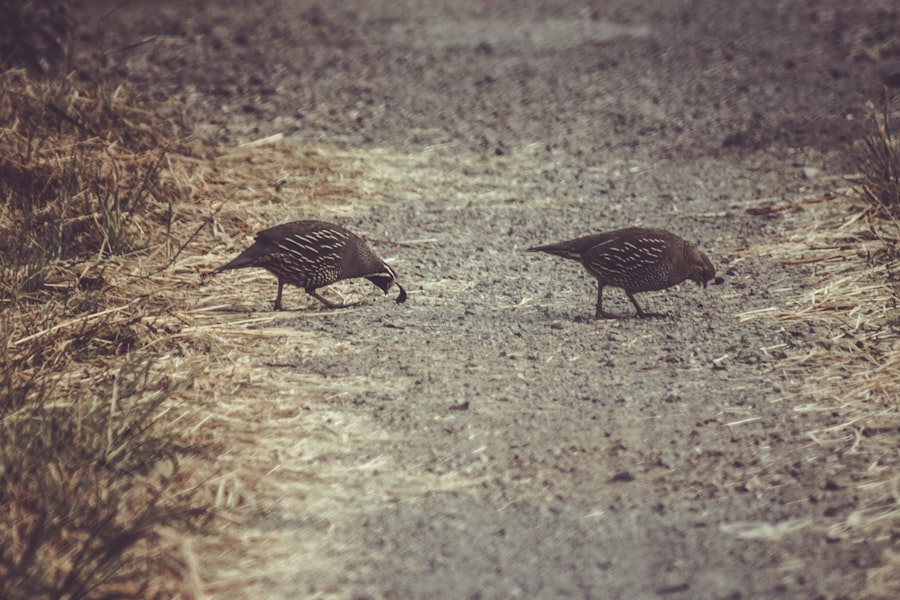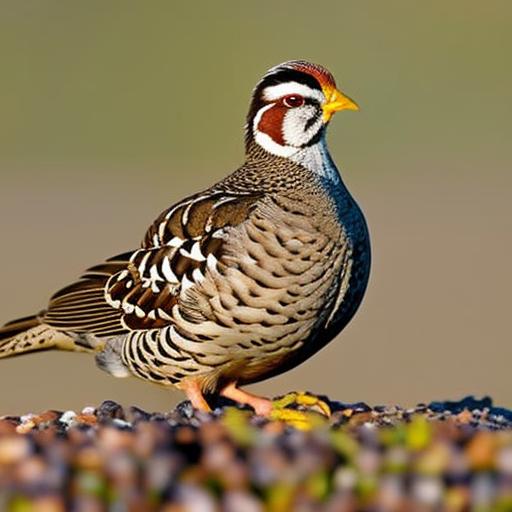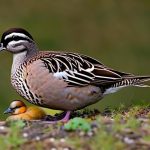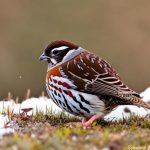Quails are small, ground-dwelling birds that belong to the pheasant family. They are known for their plump bodies, short tails, and distinctive calls. Quails are popular among farmers and hobbyists for their delicious eggs and tender meat. There are several species of quails, but the most commonly raised for farming purposes are the Coturnix quail, also known as the Japanese quail, and the Bobwhite quail. These birds are relatively easy to care for and can thrive in a variety of environments, making them an ideal choice for those looking to start a small-scale poultry operation.
Quails are social birds that thrive in small flocks, making them an excellent choice for those with limited space. They are also known for their ability to adapt to different climates and can be found in a wide range of habitats, from grasslands and woodlands to agricultural fields and urban areas. Quails are also prolific layers, with some species laying up to 300 eggs per year. This makes them a valuable addition to any farm or homestead, providing a steady supply of nutritious eggs for the table. With the right care and management, quails can be a rewarding and profitable addition to any poultry operation.
Key Takeaways
- Quails are small ground-dwelling birds that are popular for their meat and eggs.
- Quails require a minimum of 1 square foot of space per bird in their housing to prevent overcrowding.
- A balanced diet for quails includes a combination of commercial feed, greens, and protein sources.
- Regular health checks and proper sanitation are essential for preventing diseases in quails.
- Quails reach sexual maturity at around 6-8 weeks and can start laying eggs at this age.
Housing and Space Requirements
When it comes to housing quails, it’s important to provide them with a safe and comfortable environment that meets their specific needs. Quails are ground-dwelling birds that prefer to spend most of their time on the floor, so their housing should be designed with this in mind. A well-ventilated coop or cage is essential to prevent respiratory issues and ensure good air quality. The flooring should be covered with a soft, absorbent material such as straw or wood shavings to provide a comfortable surface for the birds to walk on and to absorb waste.
In terms of space requirements, quails need at least 1 square foot of space per bird in the coop or cage. This means that a flock of 10 quails would require a minimum of 10 square feet of space. It’s important to provide enough space to prevent overcrowding, which can lead to stress, aggression, and poor health. Additionally, quails are known for their ability to fly short distances, so the housing should be covered with a secure roof or netting to prevent escape. Providing adequate space and a safe, comfortable environment is essential for the health and well-being of quails.
Feeding and Nutrition
Quails have specific dietary requirements that must be met in order for them to thrive. A balanced diet is essential for good health, strong egg production, and optimal growth. A commercial quail feed that is specifically formulated for their nutritional needs is the best option for ensuring they receive all the essential vitamins, minerals, and protein they require. In addition to commercial feed, quails can also be fed a variety of kitchen scraps, greens, and insects to supplement their diet.
Water is also essential for quails, as they need access to clean, fresh water at all times. It’s important to provide water in a way that prevents spillage and contamination, such as using nipple drinkers or shallow dishes. Quails are known for their high metabolism and fast growth rate, so it’s important to ensure they have access to plenty of food and water throughout the day. By providing a balanced diet and access to clean water, quails can maintain good health and productivity.
Health and Care
Quails are generally hardy birds that are resistant to many common poultry diseases. However, they still require regular care and attention to ensure they remain healthy and free from illness. Regular health checks should be conducted to monitor for signs of illness or injury, such as changes in behavior, appetite, or droppings. It’s important to handle quails gently and with care to minimize stress and prevent injury.
In addition to regular health checks, maintaining good hygiene in the coop or cage is essential for preventing disease. This includes regular cleaning and disinfection of the housing, as well as proper waste management. Providing a clean environment will help prevent the spread of disease and parasites, ensuring the overall health of the flock. It’s also important to provide adequate ventilation and protection from extreme temperatures to prevent respiratory issues and stress. By providing regular care and attention, quails can remain healthy and productive.
Breeding and Reproduction
Breeding quails can be a rewarding endeavor for those looking to expand their flock or produce chicks for sale. Quails reach sexual maturity at around 6-8 weeks of age, at which point they can begin mating and laying eggs. To encourage breeding, it’s important to provide a balanced diet, adequate space, and a comfortable environment. A ratio of one male to every three or four females is ideal for successful breeding.
Quails are prolific layers, with some species laying up to 300 eggs per year. The eggs are small but nutritious, making them a valuable addition to any farm or homestead. To encourage egg production, it’s important to provide a well-balanced diet that meets their nutritional needs. Collecting eggs regularly will help prevent broodiness and encourage continued laying. By providing the right conditions and care, quails can be successful breeders, providing a steady supply of eggs and chicks.
Predators and Protection

Quails are vulnerable to a variety of predators, including foxes, raccoons, snakes, and birds of prey. It’s important to provide adequate protection to prevent predation and ensure the safety of the flock. This can be achieved by using secure fencing or netting around the housing area, as well as providing shelter and hiding spots for the birds to escape from predators.
In addition to physical protection, it’s important to be vigilant and observant for signs of predators in the area. Regularly checking the perimeter of the housing for signs of digging or entry points can help prevent potential attacks. Providing a safe and secure environment is essential for protecting quails from predators and ensuring their overall well-being.
Conclusion and Summary
In conclusion, quails are small but resilient birds that can be a valuable addition to any poultry operation. With their prolific egg production, delicious meat, and ability to thrive in various environments, quails are an ideal choice for farmers and hobbyists alike. By providing proper housing, nutrition, care, and protection from predators, quails can remain healthy and productive.
Quail farming can be a rewarding endeavor that provides a sustainable source of nutritious eggs and meat for the table. With the right knowledge and management practices, quail farming can be a profitable venture that offers numerous benefits for those looking to raise poultry. Whether you’re a seasoned farmer or just starting out, quail farming is worth considering as a valuable addition to your agricultural pursuits.
If you’re considering keeping quails, you may also be interested in learning about the best housing options for poultry. Poultry Wizard offers a helpful article on Snaplock Chicken Coops, which are designed to provide a secure and comfortable environment for chickens and other small birds. Check out their Snaplock Chicken Coop guide to discover how to create a suitable living space for your quails.
FAQs
What are quails?
Quails are small ground-dwelling birds that are part of the pheasant family. They are known for their small size, distinctive calls, and ability to lay eggs.
Are quails easy to keep?
Quails are relatively easy to keep, as they require minimal space and can be kept in a backyard or small coop. They are also low-maintenance and can be fed a diet of commercial quail feed or a mixture of grains and seeds.
What kind of housing do quails need?
Quails require a simple and secure housing setup, such as a small coop or hutch with a solid floor and a wire mesh roof to protect them from predators. They also need access to a nesting area and a clean, dry space for dust bathing.
What do quails eat?
Quails can be fed a diet of commercial quail feed, which is formulated to meet their nutritional needs. They can also be given a mixture of grains, seeds, and fresh greens as treats.
Do quails need special care or attention?
Quails are relatively low-maintenance and do not require special care or attention. However, they do need access to clean water, a balanced diet, and protection from predators.
Can quails be kept as pets?
Quails can be kept as pets, as they are relatively easy to care for and can provide entertainment with their unique behaviors and calls. However, it’s important to check local regulations and zoning laws before keeping quails as pets.
Meet Walter, the feathered-friend fanatic of Florida! Nestled in the sunshine state, Walter struts through life with his feathered companions, clucking his way to happiness. With a coop that’s fancier than a five-star hotel, he’s the Don Juan of the chicken world. When he’s not teaching his hens to do the cha-cha, you’ll find him in a heated debate with his prized rooster, Sir Clucks-a-Lot. Walter’s poultry passion is no yolk; he’s the sunny-side-up guy you never knew you needed in your flock of friends!







